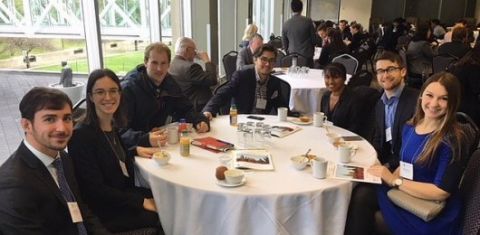
Populist movements worldwide are reshaping international law. At this pivotal moment and with support from Queen’s Law School Fund donations, 20 students were able to attend this year’s topical Canadian Council on International Law conference. Titled “Canada at 150: The Return of History for International Law,” the event examined how Canada can contribute to this evolving environment.
“The conference was an opportunity for me to learn more about international law,” says attendee Beth Burnstein, Law’20, who holds an undergraduate degree in international development studies. “I am always looking for ways to link my legal education to my knowledge of majority world goals and challenges. I wanted to learn more about how Canada relates to global and local legal challenges from an international perspective.”
The two-day conference included panel discussions on international trade, the prosecution of war criminals, environmental protection and Indigenous rights. Burnstein says that this breadth of subject matter was a key takeaway. “The broad scope demonstrates the expansive role that Canadians play in international law. I felt proud and inspired by the legal research and efforts happening in Canada but, at the same time, was reminded of the ways our country ought to do more on the international stage.”
Of most interest to her were the sessions about Canada's response to war crimes and criminals and about how domestic law deals with human rights violations made abroad by Canadian extractive companies. “While I had some knowledge of these issues before the conference, the discussion sparked a deeper interest and provided expert information from which I can begin guided research to learn more,” she says. “I felt inspired by the work of each panelist, and it was enlightening to see how distinct career choices led each panelist to become involved with the same issue they developed a passion for.”
Student attendees were also able to network at a career chat. A diverse set of international law practitioners recounted their own paths. “I felt encouraged by the many options I have as a student that could lead to a career in the field,” says Burnstein.
“One third of the career chat panel featured Queen's alumni!” she exclaims. “I was proud to represent Queen's and was reassured in my decision to pursue a legal education here.”
By Anthony Pugh